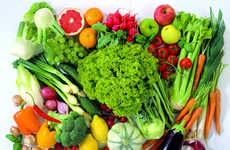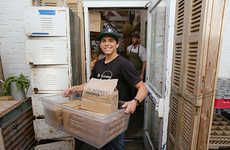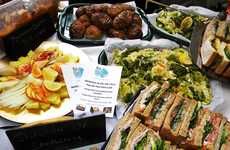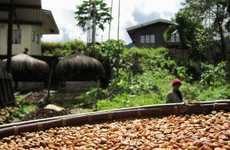
DC Central Kitchen is a Social Enterprise with a Long-Term Focus
Tiana Reid — December 24, 2011 — Social Good
References: dccentralkitchen.org & facebook
By harnessing leftover food destined for the dump, DC Central Kitchen (DCCK) isn't your average soup kitchen. Every day, the people at DCCK bring in about 3,000 pounds of food from restaurants, hospitals and hotels for consumption. The food is prepared for thousands of individuals in the community who are in need -- people in rehab, shelters or transitional living establishments.
What is more, they create an opportunity for people who are at risk to learn skills and receive training through their culinary program. Those who advance through the program are then offered positions at the DCCK catering company, or they help to find them jobs in the area.
"Today, we are expanding our operations, partnering with local farmers to procure fresh produce and begin new revenue-generating social enterprises," DCCK outlines on their website.
For DC Central Kitchen, food is the medium in which they give back and nourish -- literally and figuratively.
Contact Information
DC Central Kitchen website
DC Central Kitchen on Facebook
DC Central Kitchen on Twitter
What is more, they create an opportunity for people who are at risk to learn skills and receive training through their culinary program. Those who advance through the program are then offered positions at the DCCK catering company, or they help to find them jobs in the area.
"Today, we are expanding our operations, partnering with local farmers to procure fresh produce and begin new revenue-generating social enterprises," DCCK outlines on their website.
For DC Central Kitchen, food is the medium in which they give back and nourish -- literally and figuratively.
Contact Information
DC Central Kitchen website
DC Central Kitchen on Facebook
DC Central Kitchen on Twitter
Trend Themes
1. Community Food Systems - DC Central Kitchen is creating innovative food systems that empower communities by not wasting food and providing culinary training for those in need.
2. Sustainable Agriculture - DC Central Kitchen is partnering with local farmers as a new revenue-generation source and disrupting traditional food supply chains.
3. Social Entrepreneurship - DC Central Kitchen is revolutionizing the non-profit industry by creating revenue streams through their catering company and offering culinary job placements.
Industry Implications
1. Food Service Industry - The food service industry must emphasize sustainable practices and contribute to community empowerment like DC Central Kitchen.
2. Farming Industry - Farms can potentially increase profits and contribute to their local community by partnering with social enterprises like DC Central Kitchen.
3. Non-profit Industry - Non-profits should seek revenue streams through social enterprise like DC Central Kitchen to provide more long-term, sustainable aid and help empower the communities they serve.
4.5
Score
Popularity
Activity
Freshness















